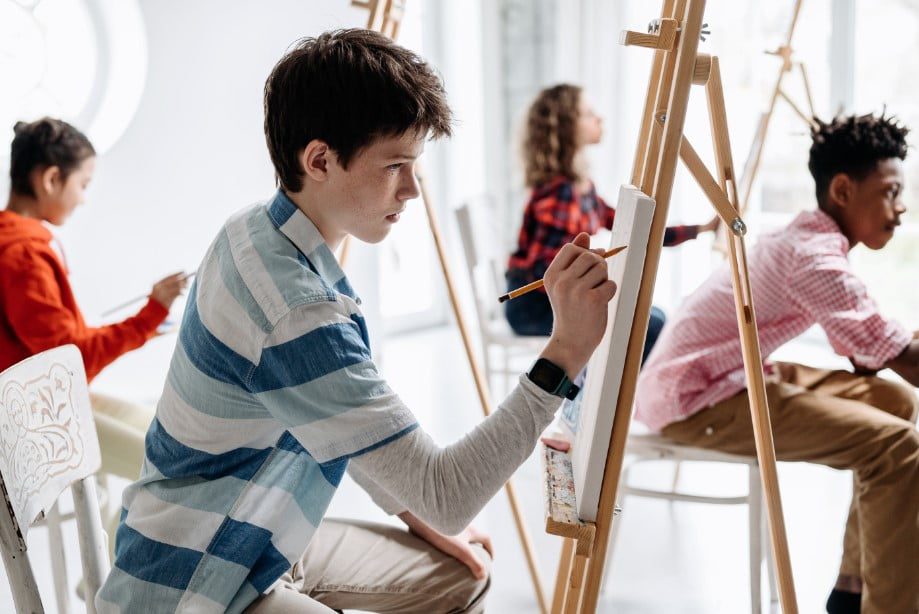6 Creative Hobbies Guaranteed to Make Your Child Smarter

[ad_1]
Did you know your child desperately needs a selection of creative hobbies and tools to amplify the capabilities of her brain? Of course, this is only a cue for parents wishing to see their kids become ‘21st century smart’.
Whether your child is gifted or not, providing these creative opportunities may just be the trigger she needs to optimize her cognitive potentials, and discovering who she REALLY is.
These hobbies are healthy for the body, and better hacks compared to only sitting in the classroom and waiting for the teacher to impart ‘knowledge’.
Question is, when do you start tapping into these creative hobbies?
Well, the ages 0 – 8, also called the formative years, are considered critical for initial learning, and upwards until 18, children have the potential to discover and learn quickly.
You must therefore start early, especially when your child’s fine motor skills begin to take shape.

The following are the few creative hobbies that should make your child smarter in the 21st century:
1. Get your child a musical instrument
We all know how listening to music is therapeutic to the body and soul. It touches us all differently, but above all leaves us at peace.
Well, it gets better when the listener becomes the creator of music through musical instruments. Of the few creative hobbies, playing a musical instrument is the one proven to activate the brain in what neuroscientists call a “full body workout.”
In recent scientific study, they found that playing a musical instrument stimulates the brain in ways we have never imagined before, as illustrated in this TedED video.
When playing an instrument, all areas of the brain are stimulated and engaged – at once! The more engaged areas of the brain include the visual, auditory, and motor cortices.
According to PMC website,
Music practice during childhood is associated with more robust neural responses to sound in adulthood. For adults with no past musical experience …, the brainstem frequency-following response is diminished in amplitude … relative to adults who started playing a musical instrument around age 9 years …
Playing an instrument such as a guitar, piano, and violin requires the brain to create, store and recall musical chords while coordinating them into beautiful melodies.
Besides, playing an instrument allows the brain to coordinate with other instruments and vocals to create meaningful harmony.
Your child will excel in the following areas when she learns to play a musical instrument:
- Enhanced executive function skills
- Good working memory
- Good short and long term memories
- A boost to the brain’s auditory pathway
- Better concentration levels
- Better mathematical skills
- A great team worker
- Great fine motor skills and coordination
- Better multitasking skills
- Enhanced self-expression
2. Your child should learn a new language
Knowing and speaking a second or third language is beneficial today, as children grow into an increasingly interconnected world. The additional language(s) gives your child the power to communicate directly with diverse cultures and communities.
Children who learn a new language before 5 can almost communicate perfectly as native speakers.
Mastering more than one language allows your child to think and innovate in multiple languages, excel in multitasking, and problem solving tasks.
Your child will benefit in the following areas when she learns additional language(s):
- Improved perception of diverse languages
- Easily connects with new people
- Has improved memory skills
- Has a better attitude towards other cultures
- Can have diverse opportunities as she grows up
3. Your child should learn to dance
Dance is integral to every global culture and a pleasurable jigsaw for cognitive development. Besides its traditional role to entertain us in a synchronized rhythm and movement, dance is actually a performing art beneficial to the working of the brain.
Dancing integrates several brain functions at once — kinesthetic, rational, musical, and emotional — further increasing your neural connectivity.
In a study published in Frontiers in Aging Neuroscience, researchers from the University of Illinois targeted 60 and 70 year olds to find out the effects of dance and other physical exercise on their aging brains.
They found that the cognitive demands of dancing like learning choreography can affect brain tissues, and boost the wiring and thickness of the white matter in the brain.
People who dance most of their lives tend to have a healthier and dense white matter of the brain compared to sedentary individuals. And just in case you are curious about the importance of white matter,
This neural information highway is now known to be involved in a range of conditions and diseases and play vital roles in brain function, learning, and the coordination of far-flung brain centers
Next time, allow your child to try out dance types such as ballet, ballroom, foxtrot, breakdance, folk dance, etc, and see how positive and fun she becomes
Your child will achieve the following physical, mental and social-emotional benefits through dance:
4. Teach your child to read every day
I know you may say reading is not a fun activity anymore – not in the 21st century, at least. Yes, the reading culture has hit a huge low, and it is upon you to ignite this beautiful culture in your child.
According to the famous English novelist Jane Austin, ‘The person, be it gentleman or lady, who has not pleasure in a good novel, must be intolerably stupid.‘
And according to Dr. Suess,
The more you read, the more things you will know. The more that you learn, the more places you’ll go.
Yes, reading is like a hidden locker of magic waiting to be unleashed in your child, and all others around you.
Once children learn to read wide and do it without pushing, you will be amazed how eager they will await the new paperback by their favorite author. Reading allows them to discover themselves and other beliefs, cultures, and many hidden stories about this world.
Values that your child will gain through reading:
- Strengthens connections in the brain
- Boosts visual processing
- A therapy against stress
- Boosts memory
- Opens a Pandora’s box of stories
- Makes your child knowledgeable
- Improves language and communication
- Teaches empathy
5. Let your child experiment with Arts and Crafts
Arts and crafts are creative forms of expression, and imaginative skills to create paintings, cartoons, sculptures, moldings, pottery and doodling.
Whereas art is the creative expression of emotionally visual items such as paintings, craft is the creative skill to output handworks such as pottery.
How about arts and crafts and the brain?
The two visual forms of expression are known to activate the reward pathways in the brain by releasing the serotonin neurotransmitter. Arts and crafts can actually boost Math concepts such as size, shape, comparison and spatial reasoning.
Using arts and craft, your child challenges her brain to wander far and wide in search of creative ways to present her thoughts.
The benefits of arts and crafts for your child:
- Express her feelings and emotions
- Lowers stress and cortisol levels
- Boosts fine motor skills
- Masters socialization skills
- Develops patience and focus
- Is always imaginative
- Is attentive to details
Arts and crafts can open a plethora of opportunities and skill placement when your child finally enters the workplace.
6. Allow your child play computer/video games
Computer and video games will definitely boost your child’s cognitive health, in addition to making her creative and innovative.
Research to date suggests that playing video games can change the brain regions responsible for attention and visuospatial skills and make them more efficient.
A good number of games present its players with puzzles and thought provoking ventures that need solutions.
Players may need to traverse treacherous terrains, cities and waters to hunt down a villain or escape from one. These ventures require critical thing skills and creativity in order to succeed.
According to Elon Musk, the immersion in video games is what started his journey to become who he is today. In his own words, video games are ‘incredibly engaging‘.
They made me want to learn how to program computers. I thought I could make my own games.
A child playing video games is constantly planning, coordinating, and applying cognitive skills to maneuver through challenges and puzzles.
Importance of computer games in the health of your child:
- Develops critical thinking and problem solving skills
- Registers improved attention and focus
- Has marked improvement in visual spatial competence
- Develops memory management
- Excels in fine motor skills
- Master communication skills
- Builds team work and collaboration skills
Should you take these creative hobbies seriously!
Definitely yes.
When you help your child learn the creative hobbies described above, you will not have to scratch your head that much when she finally starts her own life and enters the workplace.
She will have a plethora of options to choose from, and likely to benefit the vast majority of the people in her network and community.
Of course, all the above goodies will not happen miraculously. Do other things right at home to ensure your child is healthy and ready to go.
- Ensure she eats nutritious meals
- Let her get sufficient sleep at night
- Take her outdoors to see the sun and nature
- Create a conducive learning environment at home and school
[ad_2]
Source link




